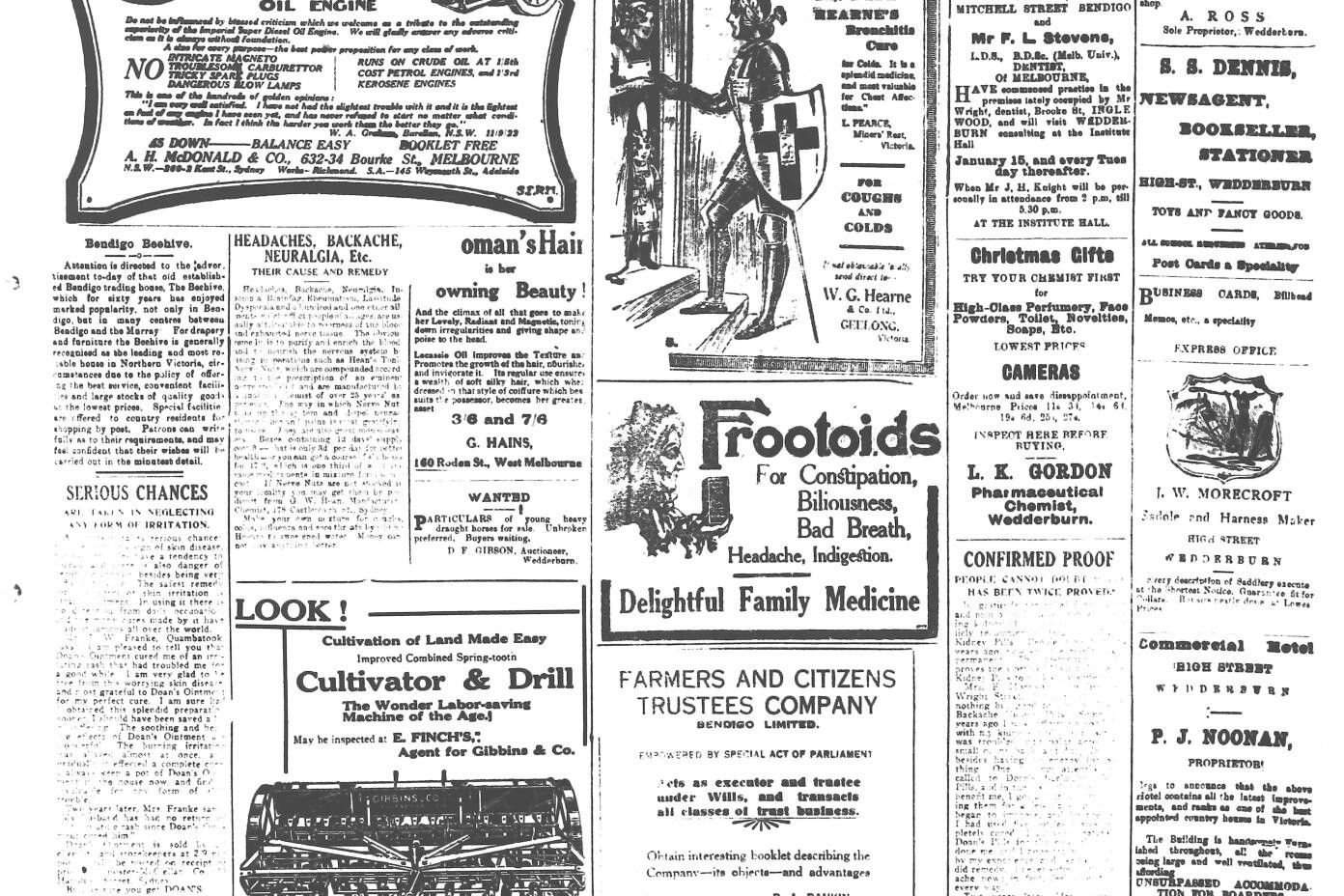General News
4 January, 2025
Power, speed and the novelty of radio in 1924
By ALAN MULRANEY RESEARCH has uncovered similarities and parallels between today and a century ago. Over the past couple of years Darryl Arnott and I have been working on the Wedderburn Express newspapers, reading every article in each edition from...

By ALAN MULRANEY
RESEARCH has uncovered similarities and parallels between today and a century ago.
Over the past couple of years Darryl Arnott and I have been working on the Wedderburn Express newspapers, reading every article in each edition from its start on June 16 1888 up to its closure on May 29 1996.
We’re indexing the names of people mentioned in those articles into our database system which now holds more than 110,000 records.
I have currently just finished the editions for 1924, which of course is our centenary year, so I thought it would be a great idea
to document everything that happened 100 years ago – and as you’ll see, what a year it was!
Electricity
The Wedderburn Progress Association (founded November 1923) in February advocated for electric street lighting and conducted a survey which showed that almost every household in town would like to have electricity in their home.
A consultant was engaged and gave a costing of £8476 for the infrastructure plus six pounds per household. A council meeting on 12 th September stated that 80 households were interested in having electricity should it be available. On October 17, Mr A.C. Bertoli (appropriate initials!) was appointed as consultant and the council decided to go ahead without delay. The order to proceed was finally advertised in the Wedderburn Express on March 20 1925.
Water meters
Currently each household paid a set fee to have town water supplied to their homes. In order to reduce wastage and make a fairer system, water meters were proposed. This was actually agreed to by residents in 1914 but never went ahead due to the outbreak of World War 1.
Speed restrictions
At a council meeting in February Cr Gray complained that motor cars travel through High Street at speeds up to 60mph (100kmh). A request was made to the State Government for speed restriction signs to be installed. A reply was eventually received on November 14 advising that the request was under consideration!
Telephone lines
By 1924 there were 36 telephones in town – 16 direct lines and four party lines with five persons per line.
During 1924 Kurraca, Wedderburn Junction and Burke’s Flat were granted telephone services. Wychitella and Charlton already had connections.
Letter boxes
As from July 1 all houses were required to have a letter box installed. Failure to do so would mean that those households would have to collect their mail from the post office.
Football club
At a meeting of delegates in Korong Vale it was suggested that large clocks be installed at all grounds so that spectators can be made aware of the amount of play time left. Also, deferred until season 1925, it was suggested that players wear numbers on their backs.
Clifden Home for Boys
Caroline Brumby and Letitia Colvin retired in early 1922 and the home was kept going by volunteers. The Try Boys Association took over the task on June 27 1924. There were 23 boys there at that time.
Death of Ezekiel Hewitt
Ezekiel was one of the founder members of the Mechanics’ Institute Hall (then called the Literary Institute and Free Library). He was 80 years old when he died in June.
Town doctor
Dr George Unwin Taylor had been the town’s doctor for 18 years. He retired at this time and was replaced by Dr. Rosse Woods. Dr. Taylor remained in town after his retirement.
New councilor
Herbert Edwin Holt (ancestor to our current Mayor Cr Gavan Holt) made his debut into council in August, defeating Alexander Anderson 561 votes to 208.
New hospital
Nurse Donnelly in October established a hospital in the old Commercial Hotel building at the corner of High St. and Racecourse Road after licensee Patrick Noonan left there in 1922. Note that the Victorian Licensing Board determined that the Korong Shire had one too many hotels for the head of population and subsequently delicensed the Commercial Hotel in December 1921.
Radios in town
Thomas Morecroft (grandson of Joseph Morecroft that built and ran the Wedderburn Hotel) in October became an agent for a new household appliance – the radio!
In 1924 the Wedderburn Express sold for three pence, a brand new motor car cost around £200 and you could build a reasonable family home for £450, parents were fined two shillings for failing to send their children to school the required number of days and you could be fined £2 for failing to register to vote. Anyone purchasing a new motor car made it into the newspaper! As you can see, a lot of the things that we take for granted today were instigated exactly 100 years ago.